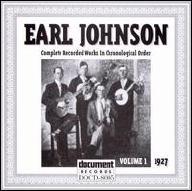Throughout these sessions, Johnson worked variously with his Dixie Entertainers and his Clodhoppers, both groups matching his characteristically wild fiddling with banjo, guitar, and energetic vocals. Emmett Bankston played banjo for both bands, while Lee Red Henderson replaced guitarist Byrd Moore on the Clodhopper recordings. Much of Johnson's sound and repertoire was clearly derived from the very popular Columbia recordings of Gid Tanner's Skillet Lickers, whose shrill falsetto backup vocals and frenzied instrumental breaks echoed throughout Johnson's recordings. Despite obvious debts to Tanner and the Skillet Lickers, Johnson's groups succeeded in creating some excellent, and even distinctive records of their own. The very first side produced by the Dixie Entertainers was their classic version of Ain't Nobody's Business, a piece which has itself come to be imitated by later performers and whose bizarre lyrics ("She runs a weenie stand, way down in no-man's land") could only have been sung by such an utter absurdist as Johnson. Occasionally, Johnson's fiddle or the accompaniment of the driving band slips beyond the reaches of rhythm, reason, and pitch, but such moments are more indicative of personal style than lack of mastery. Johnson's performances with the Dixie Entertainers and the Clodhoppers, consistently balancing technical expertise with a rowdy enthusiasm, rank him as one of the most significant fiddlers and string band leaders of the period. He continued to record until 1931, and his legacy has survived into the 21st century through the performances of modern string bands such as the Freight Hoppers. ~ Burgin Mathews, Rovi
Earl Johnson
from Gwinnett County, GA
August 24, 1886 - May 31, 1965 (age 78)
Biography
During the 1920s and '30s, the state of Georgia produced some of the wildest records in old-time or hillbilly music. Compared with the relatively steady, subtle, and sedate recordings by such groups as Charlie Poole's North Carolina Ramblers, the Georgia string bands, defined by flamboyant fiddlers like Gid Tanner, produced screeching strings and vocals on the brink of a masterful chaos. Of the Georgia fiddlers, Earl Johnson was one of the most chaotic. Born Robert Earl Johnson on August 24, 1886, in Gwinnett County, GA, he learned to play the fiddle from his father and spent his formative years playing with his two brothers, banjo-player Albert and guitarist Ester. Though both Albert and Ester died in 1923, Earl had by then begun playing with other nearby musicians, including the legendary Fiddlin' John Carson, who released the first commercial hillbilly record, also in 1923, thus paving the way for Johnson's own commercial success. Johnson made his recording debut in 1925 for Paramount, performing under the auspices of the Dixie String Band on some sides and backing banjoist Arthur Tanner on others. He also appeared as second fiddler and vocalist on several of Carson's records, with whom he continued to perform and record sporadically throughout his career. Johnson finally began recording under his own name and with his own bands in February of 1927, and over the next four years he produced close to 50 sides for the Okeh label.
Top Tracks
Albums
Videos
Close












